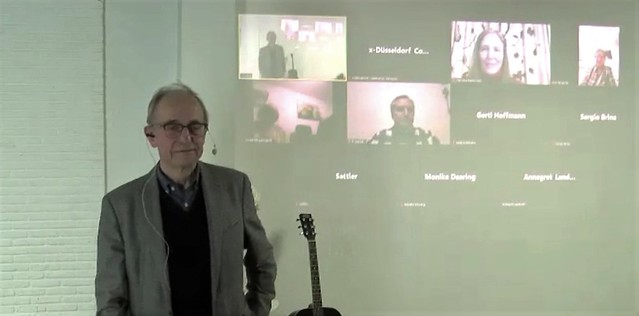Düsseldorf, Germany—UPF presented the third and final lecture of the series “Wondrous Phenomena of Quantum Physics.”
The meeting held on December 4, 2021, had a total audience of 26—six attending in person at the UPF center, with 20 more connecting online by Zoom.
Economist and author Dr. Joachim F. Reuter began his lecture with a short review of the beginning of the 20th century, when the emergence of quantum physics shook the foundations of classical physics.
He explained important impulses for the discovery of knowledge about the quantum leap of the electron with discussions about the indeterminacy phenomenon.
Today, after a century, a leading automobile manufacturer is attempting to use immaterial oscillations of thoughts and intentions in its cars. Already at the beginning of the Enlightenment famous natural scientists, for example, Isaac Newton, were interested—even if often only secretly and in the laboratory—in ideas beyond the material, which were known as mysticism and are facts today. For the bridge between material and immaterial, between matter and spirit, Dr. Reuter recalled the first two lectures of his series, the “infinity” particles and the attractors for their unification into non-physical energy fields.
He added what physicists include as spirit, which is not explainable in classical physics. Only in the last few decades has it become known that the heart has not only muscle cells, but also—like the brain—neural cells and neurotransmitters. Current scientific literature shows how disorders caused by stress and frustration are reflected in a lack of synchronization of the rhythms of the heart and brain and other body systems. Literature indicates that not only the heart rhythm, which is influenced by normal meditation techniques, but also the heart rhythm variability causes harmony and coherence of vibrations and rhythms.
These aspects of harmony and peaceful existence led to the view of the goals of UPF with its ECOSOC consultative status as a universal peace federation. Dr. Reuter referred to two bridges, the Potsdam Manifesto (2005) and the visions of the UN's unforgotten Secretary-General Dag Hammarskjöld. He explained why insights of quantum physics about the dominance of the immaterial over the material and comprehensive and impressive experiences about the “after” facilitate foundations for peaceful coexistence between religions and cultures: Worldly things often increased to “addiction” lose importance; non-material things generate satisfaction and coherence, if people learn to value themselves in order to meet others with respect without reservation.
Quoting a former Egyptian prime minister as saying, “World peace will be achieved when we emphasize spiritual laws that transcend and give meaning to the physical world,” Dr. Reuter concluded his lecture, remembering the words of UPF founder Rev. Dr. Sun Myung Moon: “Education must be a means to realize a world in which all humanity can live well together.”
Today, by relativizing worldly things and the addiction to material things, we find the potential for this in the elementary insights of the new quantum theory of being, which points the way in education.

